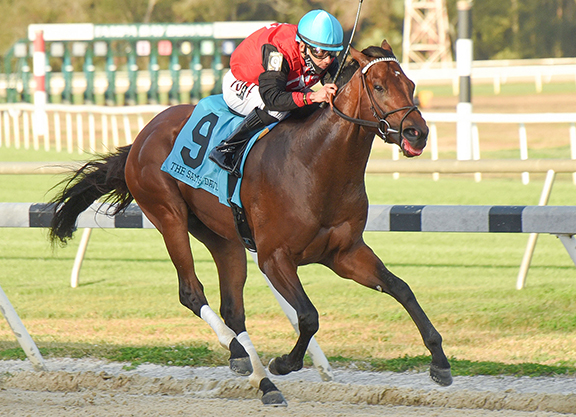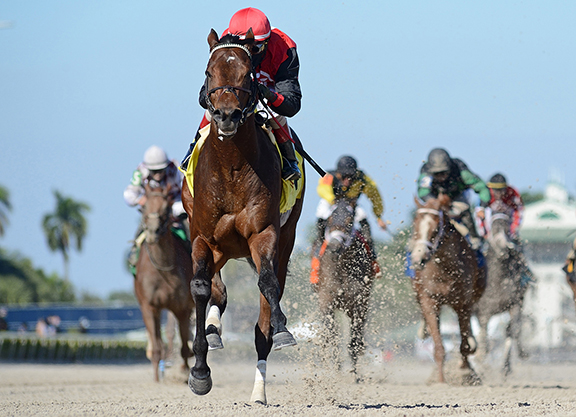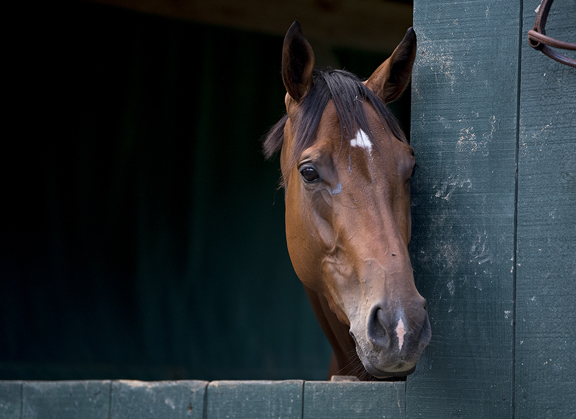It's a philosophy that sustains a stable of Rockets–but it's not rocket science. Anything but, according to Frank Fletcher. “First, you really want to work hard,” he says. “Number two, you got to have a stroke of luck. And, number three, when you get lucky and start being successful, you need to surround yourself with people a lot smarter than you are.”
Let's deal with those in reverse order. Because Fletcher says that the horse we want to discuss is all about the third rule; about the excellence of his help.
Fletcher has owned racehorses through three decades-almost all registered as a Rocket (or Rockette, for the fillies) of some kind, even if the branding can't always extend to their powers of acceleration. Rocket Time (Tiz Wonderful), C Z Rocket (City Zip), There Goes Rocket (Valid Expectations) and so on. So he has been in the game long enough not to be getting carried away by the 10 GI Kentucky Derby starting points earned by Candy Man Rocket (Candy Ride {Arg}) in the GIII Sam F. Davis S. last Saturday.
As a proud son of Little Rock, however, Fletcher is daring to wonder whether this colt, whose fourth dam is the matriarch Courtly Dee (Never Bend), might at least have a shot at the GI Arkansas Derby. Up to now he has only ever had one good enough to try, a colt who chased home Curlin (Smart Strike) in the GII Rebel S. but got no closer when following him to the big one.

Candy Man Rocket wins the Sam Davis | SV Photography
That horse was trained by the man who got Fletcher started in racing, the late Oaklawn icon Bob Holthus. They had dinner together down in Shreveport in 1989. “I don't have enough money to buy a horse!” protested Fletcher. Oh yes you do, Frank: Holthus found him a $5,500 claimer, booked Jerry Bailey to wear the new silks and, bingo, a winner's circle photo at the first attempt. That was it: Fletcher was hooked.
There have since been over 100 variations on the Rocket theme, actually a tribute to three cherished German Shepherds who have consecutively carried that name during the same span of years. The numbers have never got out of hand-the stable, managed by ex-jockey Kathleen Moore Howard, currently comprises eight horses-but their orbit seems to be expanding. Last year Frank's Rockette (Into Mischief) ran up a graded-stakes treble and now here's Candy Man Rocket exploding onto the sophomore scene.
And that's all about rule three. “You just have to surround yourself with, really, the best people,” Fletcher reiterates. “I have three great trainers, and Donato Lanni is more than just a buyer. He's a wonderful friend, who's really tried to educate me.”
Lanni has been prospecting sales for Fletcher for around 15 years. Last summer, at the postponed Spring 2-Year-Old Sale, the agent called from OBS. There was a Candy Ride colt right at the start of the auction. He'd worked a quarter in 21 flat but it was a nervous market, in the circumstances, and Lanni thought people would “sit on their hands” early. In fact, five of the first six hips were scratched and the colt-who had failed to meet his reserve both as a weanling and yearling, at $190,000 and $70,000 respectively-was next into the ring from Six K's Training & Sales.
“They dropped the hammer at $250,000,” Fletcher says. “We thought he might go to $500,000. I think we got lucky, bidding an early number. Donato likes to see the breeze and all the normal things but I think more and more important to him these days is their disposition and demeanor, how they act in the stall and when you get up close to them. He really gets inside there. He looked this horse over and over, and thought he was very calm.”
So a new Rocket entered the Fletcher arsenal. After prep with Eddie Woods, as usual, Candy Man Rocket was sent up to Bill Mott's Kentucky division. Before his debut at Churchill in November, Fletcher received a call from Mott's assistant there, Kenny McCarthy. The weather had been terrible, and on the works he had managed the colt would probably run out of gas after half a mile. But he needed to learn about the gate, about the hustle and bustle of racing, and the experience would do him good.
Sure enough, Candy Man Rocket broke alertly and raced handily until fading away in the stretch. Shipped down to Payson Park, last month he lined up for a sprint maiden at Gulfstream and was a revelation, winning by nine lengths. “At the three-eighths pole, he looked like he'd been shot out a rocket,” marvels Fletcher. “He just galloped that race.”
Even so, it was something else again to stretch out last weekend from six furlongs for a race that might put Candy Man Rocket on the Classic trail. Fletcher asked Mott his thinking.

Candy Man Rocket | Ryan Thompson
“Frank,” Mott replied. “He trains well. He looks like he's just full of himself. We have to decide whether we have a sprinter here, or a two-turn horse. The only way to know is to put him in there and see. Because if he is a two-turn horse, now's the time to find out.”
So Saturday was only his second meaningful race and, sitting home in Arkansas, his owner didn't know what to expect.
“We just had no idea,” he says. “I mean, we knew he'd come out of the gate good and told Junior [Alvarado] not to let him get out in the front. During the warm-up, Junior had to have quite a fight with him. He said the horse just was ready to take off right then. After the race, people called and said, 'I'm afraid that horse bled.' But it was just a small cut on his tongue, from when Junior was trying to keep him from getting away from him. He did a great job, and in the race he shot out of there like a cannon again.”
Yet Candy Man Rocket also saw the race out well. Mott, who also saddled runner-up Nova Rags (Union Rags), is expecting to run one of the pair back in the GII Langholm South Tampa Bay Derby on March 6, but sooner or later this horse will have to try another small stretch.
“We believe he can go any reasonable distance now,” Fletcher says. “We're not scared anymore, because he had plenty of horse at the end. He can feel the horse coming up on him. I don't know what the trainer wants to do, but ultimately I want to work my way up to the Arkansas Derby because that's where I live. But I'm not doing any dreaming, not going crazy at all. I've been asked all kinds of questions but I just want to give him his best opportunity, and we'll see where that takes us.”
That temperate approach will, of course, be matched by the trainer-a man, says Fletcher approvingly, who takes his time with horses and people alike. “Bill Mott is very calm, very deliberate, and thinks things through before he makes a decision,” he says. “And he has a lot of patience with people like myself that don't know much. Some trainers are too busy to talk. He likes to give horses time between races, and it's just so nice working with him because he won't chase a big deal it if he doesn't think it's time for the horse.”
Now, rule two: that lucky break. Fletcher has built up a portfolio of successful businesses. These days he's known principally for his car dealerships but he's also a realtor, hotelier, restauranteur. There was a time, however, when he was trying to make his way like so many young Americans before and since. His wife Judy was teaching school; Fletcher, after serving in the army, was a bank clerk working evenings in a pizza joint. Then he got a job selling paint for DuPont, and in 1966 made a sales call to a store in Sherwood. It was the second shop opened by a guy named Sam Walton.
Fletcher walked in and said, “I want to sell you 300 gallons of DuPont paint.”
“How much is that?”
“$1,500.”
Walton shook his head.
“Well, that's the smallest amount I can sell you.”
Something about the young man must have appealed to Walton, as he invited him to a lunch at the Harrison Lions Club. While they listened to the speakers, they scribbled on a notepad pushed across the table. Fletcher went off to the payphone, called Atlanta: this guy in Sherwood didn't have the money, could he sell him a smaller batch? No, but he could offer him 120-day payment. More back and forth with the notepad. Eventually Walton wrote: “Who's going to put it on the shelf?” Fletcher replied: “That will be me.”
When Walton was up to around his 20th store, he called Fletcher and asked him to quit DuPont and buy merchandise for Walmart on commission.
“So that was when luck came in,” muses Fletcher. “How lucky can you be, as someone adopted and brought up, not in California or New York, but on a farm in a small state? And who do you meet when you start off your career? I had no idea Sam Walton was going to become the richest man in America.”
Eventually Walmart grew so big that Fletcher's role became redundant. That day was a nasty shock, but he had shown enough over the eight years for Walton to encourage him: Fletcher should open a workshop, and if he came up with a product as good as he expected it would be, he could count on Walmart as a client.
Fletcher rented a garage and started making lamps. By the time he sold that business, in 2010, he was manufacturing in Taiwan and China and turning over $100 million every year. As for the auto sales, those began in 1989 from a mobile home with an awning. There are now dealerships in a dozen brands around Arkansas and Missouri.
But all this goes back to rule one: a work ethic nourished by a disciplined but loving rural upbringing in the years after the war.
“Back then, I think they just came to the hospital and looked through the glass and picked out somebody!” says Fletcher. “I got adopted by some great parents when I was a baby [in 1943]. I enjoyed that life on the farm. Early awake, and early to bed, but a good place to be brought up. I had that all drilled into me and I'm thankful for it.
“Because the sad thing is, I have a lot of friends that just hate work. They go to work because they have to make a living. You're blessed if you can do something that makes your heart beat fast. I don't have any hobbies: don't play golf, don't fish. I work pretty hard, but I do it because I love it. I enjoy getting out of bed, getting my pants on and going to my office-six days a week, at least. I mean, I'm sitting here right now looking at 100-something trade-ins from this weekend. What are we going to do with this car? Wholesale it? Rebuild it? I make a decision on every one that comes in.”
The single hobby he does permit himself, then, represents something of a release valve. And the racetrack, he says with a laugh, is “a good way to get rid of any money that you make.”
He rode horses round the farm as a youngster, and actually in rodeos as a beanpole adolescent. (He was also an all-state basketball player in Junior High.) But his love of animals starts with the German Shepherds.
“I love all dogs, but these are very protective and just wonderful companions,” he says. “When the first Rocket died at age 11, he had cancer, I thought I would never want another one because it hurt so bad. But then about two weeks later, the veterinarian that had tried to keep him alive brought another German Shepherd. I said, 'I don't want that dog. Take him away.' He said, 'Keep him overnight and see.' Next day, of course, I loved him. And then he lived 11 years, and now I'm on Rocket number three, who's seven.”

Frank's Rockette | Sarah Andrew photo
So friends always know that a horse with Rocket in his name is likely part of his stable, and there will be no mistaking the hometown hope if Candy Man Rocket can make the Arkansas Derby. The same card, meanwhile, is already on the agenda for Frank's Rockette, whom Mott is targeting at the Carousel S. She's actually homebred, out of graded stakes winner Rocket Twentyone (Indian Charlie). Frank's Rockette disappointed in the GI Breeders' Cup Sprint, but she has already resumed her progress with another stakes success at Fletcher's local track a few days ago.
“I made a mistake when I put her in with the colts at the Breeders' Cup,” Fletcher says. “That was the only race in her life that she never tried. She got intimidated, I guess. It was a bad call, but there were some terrific sprinters in the filly division and she had run the times. But I learned a lesson. Otherwise she's never finished less than second in her whole career.”
One way or another, then, Derby Day on their home track in April promises much for Fletcher, his family and friends-and all talk of the Twin Spires can be deferred until then.
“We're still a very small operation,” Fletcher stresses. “We're nowhere near the people I'm competing with. We've been lucky a few times, and we have Frank's Rockette. But we haven't had a colt in a long time. So it's very, very exciting. We're not used to this.”
But go back to his opening premise. Hard work: check. Good luck: check. “And then I figured out right quick that I wasn't very smart,” Fletcher says. “So I hired a great crew around me. Every day, I lean on people who are smarter than I am. And so yes, if you can do that, the little guy can compete.” We've been lucky a few times, and we have Frank's Rockette. But we haven't had a colt in a long time. So it's very, very exciting. We're not used to this.”
But go back to his opening premise. Hard work: check. Good luck: check. “And then I figured out right quick that I wasn't very smart,” Fletcher says. “So I hired a great crew around me. Every day, I lean on people who are smarter than I am. And so yes, if you can do that, the little guy can compete.”

The post Candy Man Putting the Rocket Into Little Rock appeared first on TDN | Thoroughbred Daily News | Horse Racing News, Results and Video | Thoroughbred Breeding and Auctions.
Source of original post



